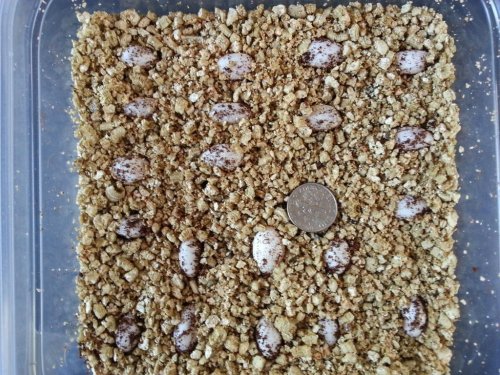jajeanpierre
Chameleon Enthusiast
My young female quad quad laid her second clutch of eggs yesterday, twenty eggs in a variety of sizes and shapes. Some seemed really small but I am very inexperienced, some seemed long with flat sides. Photo attached, comments greatly appreciated.
Can small eggs still hatch normally?
She laid her first clutch of 12 eggs June 27th. The one egg that looked to my novice eye as not good molded over quickly. Another died recently but it was fertile. The remaining 10 look great.
She laid her second clutch of 20 eggs yesterday, 11 weeks plus a day after laying her first clutch. She allowed a single breeding six weeks plus five days ago.
She's a young w/c female who weighed 21g when I bought her the end of February.
Is there any way to stop her producing eggs? I don't want to reduce her nutrition since she has produced such big clutches and is quite young. I also don't want her to waste energy producing infertile eggs. I suspect she will just go ahead and produce eggs, both infertile and fertile from retained sperm anyway, even while reducing her nutrition. My thoughts are that if she is going to lay the eggs anyway, they might as well have the best chance to hatch.
My ambient temps in the room are about as low as I can get them maybe 68F-70F at night with temps under the lights high in the enclosures around 78F in the day. Temperatures are a lot lower in the bottom of the enclosures during the day. No basking lights of course.
I would appreciate advice on how to handle this female to get both the most healthy babies from her and for her to have a decent life. Thanks.
Can small eggs still hatch normally?
She laid her first clutch of 12 eggs June 27th. The one egg that looked to my novice eye as not good molded over quickly. Another died recently but it was fertile. The remaining 10 look great.
She laid her second clutch of 20 eggs yesterday, 11 weeks plus a day after laying her first clutch. She allowed a single breeding six weeks plus five days ago.
She's a young w/c female who weighed 21g when I bought her the end of February.
Is there any way to stop her producing eggs? I don't want to reduce her nutrition since she has produced such big clutches and is quite young. I also don't want her to waste energy producing infertile eggs. I suspect she will just go ahead and produce eggs, both infertile and fertile from retained sperm anyway, even while reducing her nutrition. My thoughts are that if she is going to lay the eggs anyway, they might as well have the best chance to hatch.
My ambient temps in the room are about as low as I can get them maybe 68F-70F at night with temps under the lights high in the enclosures around 78F in the day. Temperatures are a lot lower in the bottom of the enclosures during the day. No basking lights of course.
I would appreciate advice on how to handle this female to get both the most healthy babies from her and for her to have a decent life. Thanks.





